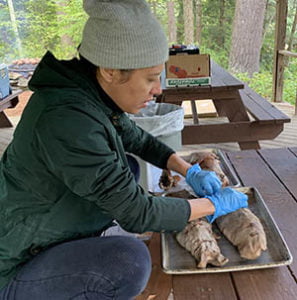News Atlanta-Based Chef and Activist Conducts Week-Long Residency
A Hawks in Flight Feature
James Beard Award-nominated chef and food advocate Marciela Vega joined the Hartwick community for a five-day residency last week. Based in Atlanta, Vega has more than a decade of food-related work experience as an executive chef, recipe developer/contributor, prop maker, and food stylist, in addition to several years of teaching seed-to-plate education.
Vega was a guest of Professor of Art & Art History Stephanie Rozene, and funded by a National Endowment for the Humanities grant.
Visits throughout her life to her family’s lands in Guanajuato, Mexico, have informed her approach and philosophy to cooking, and directly influence her current work as a chef. She seeks connections with her ecosystems through the food grown by her community, how it is then shaped, and the stories told from it.
During the week, Vega took part in a variety of public and private events. She gave a lecture titled, “Clay and Maiz: A Culinary Exploration,” which discussed her research into agroecology and pre-historic foodways, and the relationship to her own life’s experience. During the presentation, she reflected on her work as the owner of Chico Mexican Provisions – her specialty food product line that combines well thought-out sourcing, ethical practices, and cooking methods – her time as the executive chef of 8Arm in Atanta, and the ways in which culture and identity are bound through food.
Vega also spent time with Rozene’s classes to observe and discuss the collaboration between students studying to use clay and the cooking process. The class used clay pots to nixtamalize corn – a traditional maize preparation process in which dried kernels are cooked and steeped in an alkaline solution, usually water and food-grade lime – to make pink corn nixtamal sourdough bread. During the first few weeks of classes Rozene’s students created hand-built clay bread rising baskets to use in the baking process.
On Friday of True Blue Weekend, Vega even presented an experimental cooking class at the Pine Lake Environmental Campus. There she used its cob oven and pavilion fire pit to demonstrate prehistoric cooking techniques, such as wrapping local trout, vegetables, and fruit in clay and cooking them over the fire, and baking off some of the pink sourdough bread for the community to share.
“Over the course of the last week, students were able to directly apply learned knowledge and participate in scholarly artistic inquiry through Chef Mari’s visit by connecting food, farming, pottery, cooking and cultural identity to the real world,” Rozene said. “This is FlightPath in action.”